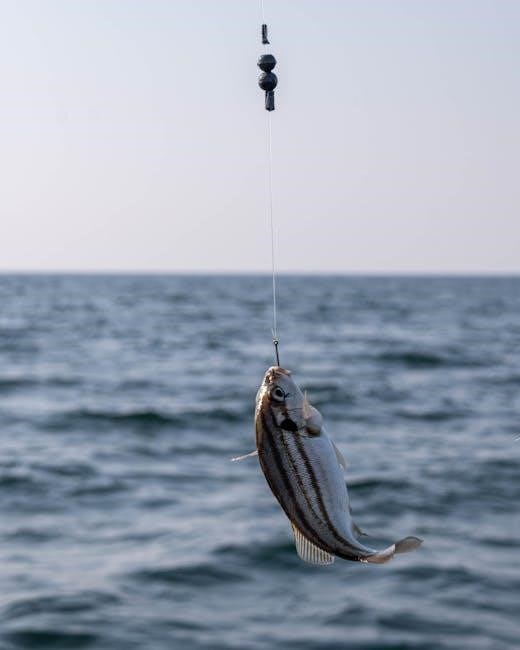Overview of New Jersey Saltwater Fishing Regulations 2024
New Jersey’s 2024 saltwater fishing regulations ensure sustainable marine resources and protect key species․ These rules‚ enforced by state authorities‚ balance conservation and recreational fishing interests․
1․1․ Importance of Adhering to Regulations
Adhering to New Jersey’s saltwater fishing regulations is crucial for maintaining ecological balance and ensuring sustainable fishing practices․ These rules protect endangered species‚ prevent overfishing‚ and preserve marine habitats․ Compliance helps safeguard fish populations for future generations while supporting the state’s marine ecosystem․ Anglers who follow regulations contribute to the long-term health of New Jersey’s coastal waters‚ ensuring recreational and commercial fishing remains viable․ Enforcement measures emphasize the importance of responsible fishing practices․
1․2․ Key Updates for 2024
The 2024 New Jersey saltwater fishing regulations include updated bag limits‚ size restrictions‚ and gear guidelines to enhance conservation efforts․ Seasonal fishing closures and protected areas have been adjusted to safeguard vulnerable species․ Additionally‚ new measures aim to reduce bycatch and promote sustainable fishing practices․ Anglers should review these changes to ensure compliance and support the preservation of marine ecosystems․ Staying informed is essential for responsible and lawful fishing in New Jersey’s coastal waters․
License Requirements for Saltwater Fishing in New Jersey
A valid fishing license is required for saltwater fishing in New Jersey‚ with options for residential and non-residential anglers‚ helping fund marine conservation efforts․
2․1․ Residential vs․ Non-Residential Licenses
New Jersey offers distinct licensing options for residents and non-residents․ Residential licenses require proof of state residency‚ while non-residential licenses are available for visitors․ Both ensure legal fishing privileges‚ but costs and duration vary․ Residents benefit from reduced fees‚ reflecting state-supported conservation efforts․ Non-residents‚ including tourists‚ can opt for short-term or annual licenses‚ accommodating varying stays․ Proper licensure is mandatory for all anglers aged 16 and above‚ ensuring compliance with marine conservation goals․
2․2․ Special Permits for Specific Species
New Jersey requires special permits for targeting specific marine species‚ such as sharks‚ tunas‚ and certain migratory fish․ These permits aim to conserve vulnerable populations and ensure sustainable fishing practices․ Anglers must obtain these permits separately from their general fishing license․ The permits are issued by the New Jersey Department of Environmental Protection and are mandatory for both recreational and commercial fishing․ They help track catches and enforce species-specific regulations effectively․
Bag Limits and Size Restrictions
New Jersey’s 2024 saltwater fishing regulations include specific bag limits and size restrictions to conserve fish populations․ Anglers must adhere to these rules to ensure sustainability․
3․1․ Daily Catch Limits for Popular Species
The 2024 New Jersey saltwater fishing regulations outline daily catch limits for popular species like striped bass‚ bluefish‚ and flounder․ These limits vary by species and are designed to ensure sustainable fishing practices․ Anglers must stay informed about specific quotas to avoid exceeding allowable catches․ Adhering to these limits helps maintain healthy fish populations and supports the long-term viability of marine ecosystems․ Detailed information is available in the official 2024 NJ Saltwater Fishing Regulations PDF․
3․2․ Minimum and Maximum Size Requirements
The 2024 New Jersey saltwater fishing regulations specify minimum and maximum size limits for various species to protect juvenile fish and maintain balanced ecosystems․ For example‚ striped bass must be at least 28 inches‚ while bluefish have no maximum size restriction․ These size requirements ensure sustainable fishing practices and help preserve fish populations for future generations․ Anglers are encouraged to consult the official 2024 NJ Saltwater Fishing Regulations PDF for species-specific details․
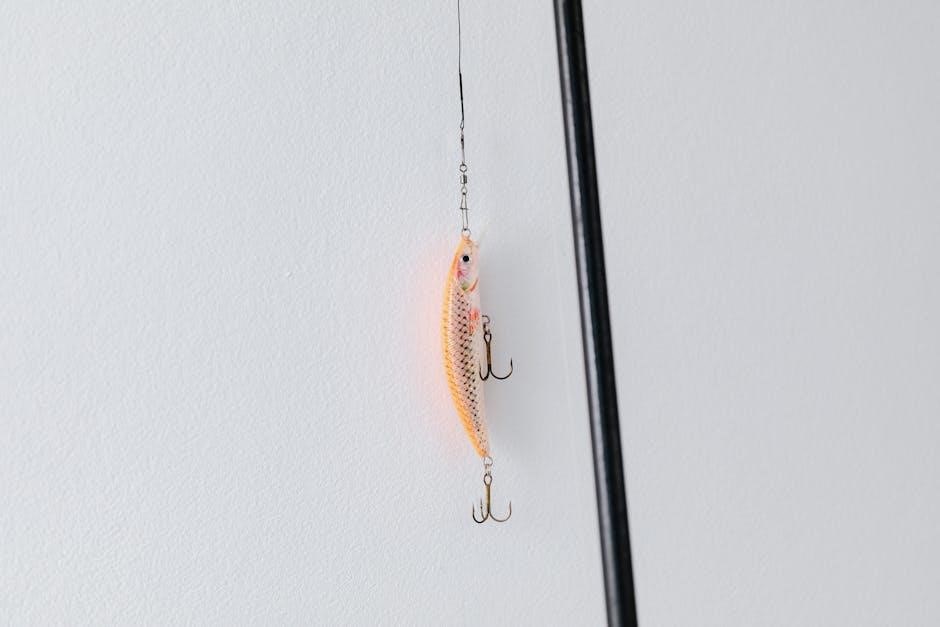
Gear Restrictions and Prohibited Practices
The 2024 regulations prohibit certain fishing gear‚ such as gillnets and longlines‚ to minimize bycatch and protect marine habitats․ Specific gear restrictions aim to ensure sustainable fishing practices․
4․1․ Allowed Fishing Gear and Equipment
The 2024 New Jersey saltwater fishing regulations permit the use of rods‚ reels‚ and lines with up to six hooks․ Nets‚ traps‚ and spears are allowed under specific conditions․ Anglers may use lures‚ bait‚ and artificial attractants‚ but gear that causes habitat damage or excessive bycatch is restricted․ The focus is on sustainable practices to protect marine ecosystems while enabling recreational and commercial fishing activities effectively․
4․2․ Prohibited Fishing Methods
Prohibited fishing methods in New Jersey include the use of dynamite‚ electrical devices‚ and chemicals that harm marine life․ Netting or trapping in closed areas or during restricted seasons is also banned․ Longlining and certain types of trawling gear are restricted to prevent overfishing and habitat damage․ These prohibitions aim to protect vulnerable species‚ maintain ecosystem balance‚ and ensure sustainable fishing practices for future generations․
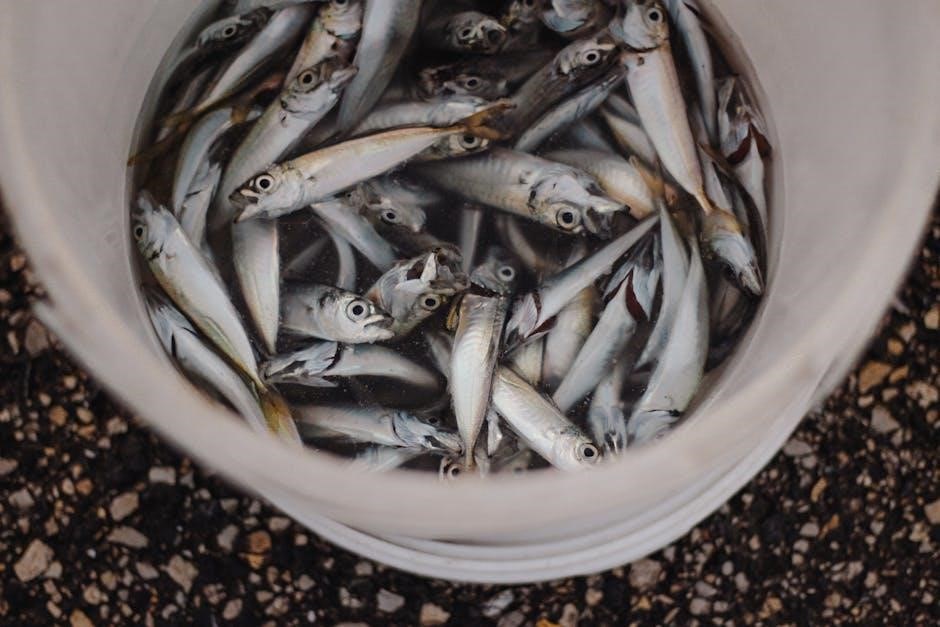
Seasonal Variations in Regulations
New Jersey’s saltwater fishing rules vary by season to protect species during spawning and vulnerable life stages‚ ensuring sustainable fishing practices throughout the year․
5․1․ Fishing Seasons for Different Species
New Jersey’s saltwater fishing seasons vary by species to align with their biological cycles․ Striped bass‚ for example‚ typically have open seasons during spring and fall migrations‚ while bluefish are more abundant in summer months․ Summer flounder and black sea bass seasons often run from May to September‚ with specific closures during spawning periods․ These timed regulations help protect vulnerable life stages and maintain healthy fish populations for future generations․
5․2․ Closed Areas and Protected Zones
New Jersey designates certain marine areas as closed or protected to safeguard critical habitats and spawning grounds․ These zones‚ such as near coral reefs or state parks like Cheesequake and Island Beach‚ are off-limits to fishing to ensure biodiversity and ecosystem balance․ Seasonal closures may also apply to areas where juvenile fish or endangered species are present‚ helping to replenish stocks and maintain ecological health․
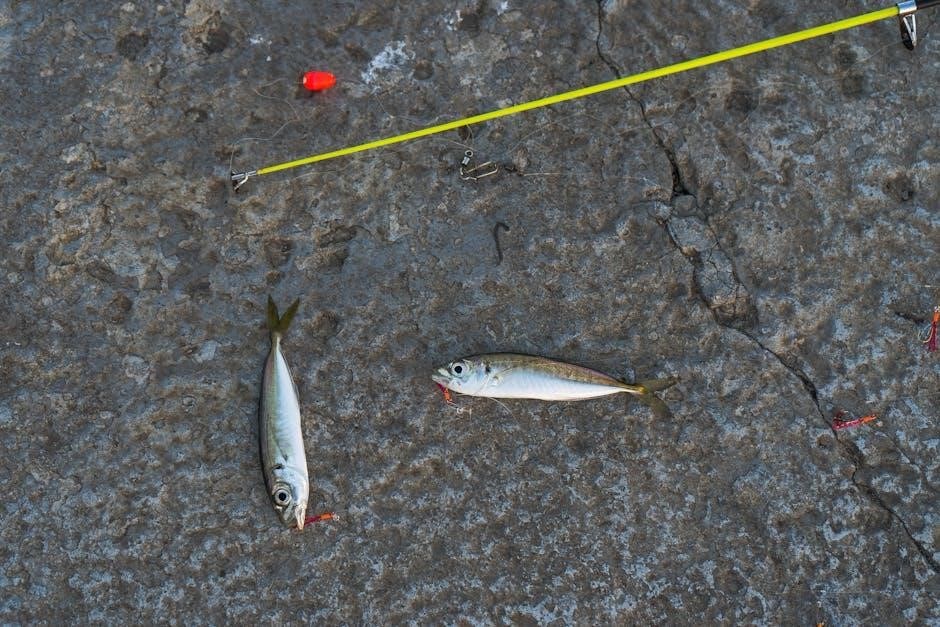
Enforcement and Penalties
Authorities strictly monitor compliance with saltwater fishing regulations in New Jersey․ Violations result in fines‚ license suspensions‚ or legal action to protect marine resources and ensure sustainability․
6․1․ Monitoring and Inspection Processes
The New Jersey Division of Fish and Wildlife actively monitors saltwater fishing activities through patrols‚ electronic monitoring systems‚ and random inspections․ Officers check licenses‚ gear‚ and catches at docks‚ marinas‚ and beaches to ensure compliance․ Inspections focus on bag limits‚ size restrictions‚ and prohibited gear․ The goal is to protect marine ecosystems while maintaining fair access for anglers․ Public cooperation is crucial for effective enforcement and sustainable fishing practices․
6․2․ Fines and Consequences for Violations
Violations of New Jersey’s saltwater fishing regulations result in fines ranging from $100 to $500 or more‚ depending on the offense․ Repeat offenses may lead to gear confiscation or license suspension․ Severe violations‚ such as poaching or using prohibited gear‚ can result in criminal charges․ These measures aim to deter illegal activities and protect marine ecosystems while ensuring fair access to resources for all anglers․ Compliance is essential to avoid penalties and support conservation efforts․
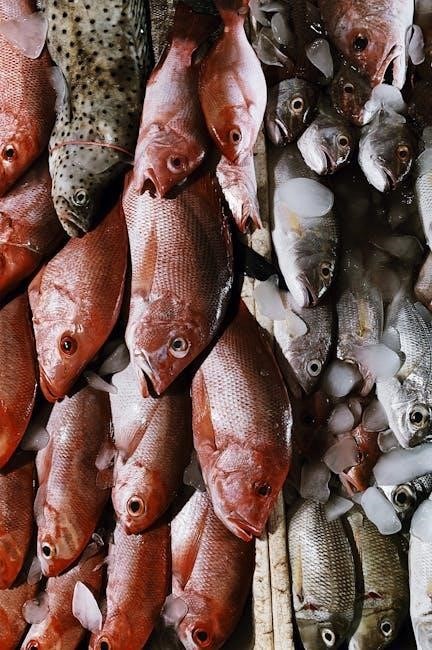
Obtaining the 2024 NJ Saltwater Fishing Regulations PDF
The 2024 NJ Saltwater Fishing Regulations PDF is available on the official NJDEP website․ Download it directly or access it through their mobile app for convenience․
7․1․ Official Sources for the PDF Document
The 2024 NJ Saltwater Fishing Regulations PDF can be downloaded from the official New Jersey Department of Environmental Protection (NJDEP) website․ Additionally‚ it is available on the NJ Fish and Wildlife portal․ For convenience‚ the document can also be accessed through the NJ․gov portal or via the NJDEP mobile app․ Ensure to use these official sources for the most accurate and up-to-date information to avoid outdated or incorrect versions of the regulations․
7․2․ How to Download and Access the Guide
To access the 2024 NJ Saltwater Fishing Regulations PDF‚ visit the official New Jersey Department of Environmental Protection (NJDEP) website․ Navigate to the “Fishing” section and search for the 2024 guide․ Click the download link to save the PDF․ The document is also available on the NJ Fish and Wildlife webpage․ Ensure your device has a PDF reader installed to view the guide․ This resource is free and accessible on both desktop and mobile devices for convenience․ Stay informed with the latest updates by referring to this official guide regularly․
Additional Resources and References
For more details‚ visit the NJDEP website or contact local fishing authorities․ Additional guides and updates are available at NJ Fish and Wildlife offices and online portals․
8․1․ Websites and Hotlines for Further Information
Visit the official NJDEP website or the NJ Fish and Wildlife portal for comprehensive guides․ Call the NJ Fishing Information Hotline for updates․ Additional resources are available at NJ․gov and local marine conservation offices․
8․2․ Workshops and Seminars on Fishing Regulations
Workshops and seminars are offered statewide to educate anglers on 2024 regulations․ These sessions cover topics like sustainable fishing practices‚ gear usage‚ and updates on seasonal restrictions․ Local tackle shops‚ marine conservation groups‚ and community centers often host these events․ Check the NJDEP website or visit coastal communities for schedules and registration details․ These resources help anglers stay informed and compliant with current fishing laws․
